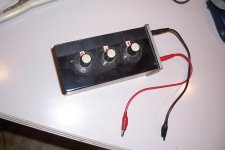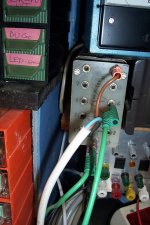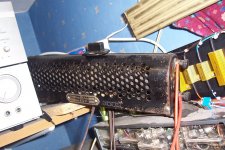Hi I usually use an electronic load with nearly no functionality or to be honest, I think it have some features but the manual and the unit is almost impossible to get to do anything. 30 min of trying for 60 sec of constant current test!
I am thinking if it is possible to buy a new electronic load where I can program "sweeping" resistance, i.e. to test an amplifier from 8 to 2 Ohm or to test how a power supply react to change in load.
Is that something an electronic load normally can do?
What would you recommend, a Siglent?
I am thinking if it is possible to buy a new electronic load where I can program "sweeping" resistance, i.e. to test an amplifier from 8 to 2 Ohm or to test how a power supply react to change in load.
Is that something an electronic load normally can do?
What would you recommend, a Siglent?
Wouldn't your electronic load only be for DC ? I don;t know of anything like that for amplifier testing. A few really high power resistors usually suffice tbh or if you get really serious you can get creative with some old electric fire elements with the resistance wire wrapped around them.
Yes an electronic load DC, I did just think it could be great if I could test from 8 ohm and down, without having to switch resistors and maybe even produce a graph? 🙂
Yes you can do without an electronic load, like you can replace most other devices to manual changes, but I think it will be a lot easier and maybe teach me more, if I can play some more then just i.e. a couple of 8,4 and 2 Ohms resistors.
There might be purely resistive, programmable power resistors around (look on Aliexpress for example), but the normal way to do that would be to assemble a relay board, a number of precision, power resistors and drive it with a GPIB controller or an equivalent from vendors like National Instruments.
You can do the same for 1/10th or 1/100th of the cost by hand-picking power resistors in a binary sequence, adding some relays and writing a small piece of software.
For DIY use, I don't see the necessity, unless you have something very specific in mind
You can do the same for 1/10th or 1/100th of the cost by hand-picking power resistors in a binary sequence, adding some relays and writing a small piece of software.
For DIY use, I don't see the necessity, unless you have something very specific in mind
Okay yes you can build one, but do no one ever need such a unit, as a load to test?
I would guess that you could buy that type of unit in every price group. You can easily buy a constant load, constant voltage and so om, even that you could get the same result by using 5 min on a few components, so why not on something that would take a lot more to build and have a lot mere functionality? 🙂
I would guess that you could buy that type of unit in every price group. You can easily buy a constant load, constant voltage and so om, even that you could get the same result by using 5 min on a few components, so why not on something that would take a lot more to build and have a lot mere functionality? 🙂
2 x 4 ohm power resistors and some relays, or just switch, will do 8, 4 or 2 ohms. Why build anything more complicated than it needs to be?
Lol yes you are right, it can be done simple🙂 But why is that simple functionality not just build into a normal electronic load? 🙂
Yes, we do. Some examples:Okay yes you can build one, but do no one ever need such a unit, as a load to test?
I would guess that you could buy that type of unit in every price group. You can easily buy a constant load, constant voltage and so om, even that you could get the same result by using 5 min on a few components, so why not on something that would take a lot more to build and have a lot mere functionality? 🙂
Simple programmable resistors:
A continuously programmable resistor:
No need to reinvent the wheel, unless you set up a production line
For amplifier testing, there is no such thing as constant current or constant voltage: it would end in disaster.....
Attachments
Great project! 🙂
No constant current or voltage could maybe give some problems but sweeping resistance could be great. What I am trying to say is that when you can buy electronic loads with all sort of great user interface and constant voltage, power, resistance and current, why is there not a sweep function? For constant anything, can you just make something out of a few components, why then have units up to several thousands of dollars and don't make any sweeping functionality?
No constant current or voltage could maybe give some problems but sweeping resistance could be great. What I am trying to say is that when you can buy electronic loads with all sort of great user interface and constant voltage, power, resistance and current, why is there not a sweep function? For constant anything, can you just make something out of a few components, why then have units up to several thousands of dollars and don't make any sweeping functionality?
Keep in mind what an audio power amp does - it drives loudspeakers. Loudspeakers aren't constant current nor constant voltage, they are mostly resistance with a little capacitance and inductance thrown in. They can be modeled simply using passive components. It just ... doesn't make any sense to test an audio amplifier into a CC load.
The function is generally not needed. People that actually need it assemble industrial building blocks as I outlined.
You are completely correct, that's also why I am asking about a sweeping resistance function. But when that is said, to other projects could sweeping current or power be nice. 🙂
Elvee you I did understand that, I am just wondering on why some would buy a special unit (a electronic load) to simulate something constant, like constant resistance, when you can just use a couple of resistors? 🙂
For testing something like a power supply, particularly a battery type supply, it might make sense to use a CC supply as the output voltage may vary. But the load will be mostly sinking DC current in this scenario and doesn't have to deal with varying AC frequency like an audio dummy load might. Different tools for different jobs.
hmm yes that seems logical, but apart from making a sweeping resistor yourself, is there a unit you can buy?
As others have stated, a set of high-power resistors and a convenient mechanism to switch them will work well, DC or AC.
Remember that an e-load will have its own hash and junk, so if you're looking to observe noise behaviour under load, you will need to filter this out. I use e-loads to test PSUs daily, but they are more to ensure something stays in regulation under load, can handle abuse - and doesn't overheat, than for forensic evaluation.
Remember that an e-load will have its own hash and junk, so if you're looking to observe noise behaviour under load, you will need to filter this out. I use e-loads to test PSUs daily, but they are more to ensure something stays in regulation under load, can handle abuse - and doesn't overheat, than for forensic evaluation.
Thanks hmm thinking, what if I connected my signal generators output to an voltage controlled resistor? In that do I imagine I can control the resistors resistance and sweep to my harts content? 🙂
16-1 Ohm?
16-1 Ohm?
I think there is still some confusion on what an electronic load is. An electronic load is usually a bank of transistors with circuity to get them to emulate a resistance or current or fixed voltage (to look like a battery). However they only work when the current is DC going one way. Amplifiers are AC out and need a load that will work for both polarity. Its possible to create such a thing (a high power amp with the right feedback could do this) but its a lot of complexity for not much.
There was a test product that had an array of resistors, caps and inductors to automatically go from a resistive load to reactive loads at impedance extremes and plot the amps ability to manage but its was expensive and proprietary and seems to have vanished in the last 10(?) years. A handful of resistors, caps and inductors can do the same. Still needs switches, relays or patch cables like Elvee's sample.
There was a test product that had an array of resistors, caps and inductors to automatically go from a resistive load to reactive loads at impedance extremes and plot the amps ability to manage but its was expensive and proprietary and seems to have vanished in the last 10(?) years. A handful of resistors, caps and inductors can do the same. Still needs switches, relays or patch cables like Elvee's sample.
Thanks hmm thinking, what if I connected my signal generators output to an voltage controlled resistor? In that do I imagine I can control the resistors resistance and sweep to my harts content? 🙂
16-1 Ohm?
Can you provide more details on your "voltage controlled resistor"? A small Jfet can emulate a voltage controlled resistor but not useful for this.
- Home
- Design & Build
- Equipment & Tools
- Can a electronic load this?



